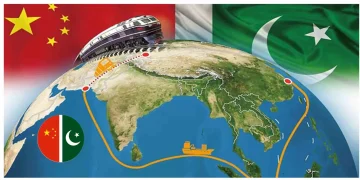Syed Qamar Afzal Rizvi
IMPOSING sanctions is not a new thing but common practice of the US foreign policy. This legacy of the United States remains a perpetual source of discomfiture for other states. In this regard, the US threat to impose punitive sanctions on Turkey regarding its purchase of the S-4000 missile system from Russia has caused an acute tension between Washington and Ankara. The mindset working in Washington is of the advocacy that If Washington doesn’t draw sanctions on Ankara, it will be regarded as a paper tiger and ultimately Brussels will find justification for avoiding sanctions on Iran. But voice of sanity prevents US to do so because Iran is already under fire of sanction threat and this is not productive measure for Washington to provoke its traditional historical NATO’s partner, Turkey.
And yet, avoiding American reaction about the S-400 deal with Moscow and the threat of sanctions, Ankara began receiving the first trench of a sophisticated Russian surface-to-air missile system on Friday, a move that annoys the NATO commanders since it welcomes a Russian technology inside the domain of its strategic NATO ally one from which probably the strikes into Syria have been targeted. Additionally, the Russian engineers who would install this system — the American officials’ fear would have access to learn the very know-how about the American-made fighter jets that yet remain the part of Turkey’s arsenal. Washington’s stand is simple. It does not encourage Turkey to buy the Russian technology because if it does, the US will not abide by its F-35 warplanes ’deal America’s most sophisticated warplane to Ankara.
Being a US-NATO ally, “Turkey provided a geostrategic location for the US to essentially be on the underbelly of the Soviet Union, but all that changed with the collapse of the Soviet Union in 1991’’, said Aaron Stein, Director of the Middle East Programme at the Foreign Policy Research Institute. Stein said, With a host of other countries ringing Russia now available to join NATO, Turkey’s geographic location was no longer as important. In addition, Washington has had used Turkish air bases for warfare, including the fighting in Syria, where it ended up arming Kurdish rebels Ankara was fighting against. Retrospectively, Washington and Ankara failed to agree on a purchase of Patriot missiles, and by 2015, Germany and the US began pulling their own Patriot systems out of Turkey altogether, even as Erdogan warned of an increased threat from Russian and Syrian government attacks across the border. Most significantly, Turkey’s decision to purchase the equipment solidifies ties between Russia’s President Putin and Turkish President Erdogan; yet this move creates a challenge to its NATO-partnership. A NATO official told CNN, “It is up to allies to decide what military equipment they buy. However, we are concerned about the potential consequences of Turkey’s decision to acquire the S-400 system. “The official added, “interoperability of our armed forces is fundamental to NATO for the conduct of our operations and missions.” Noting that NATO members see the interoperability of their military forces as a fundamental strength of the alliance, the official added, “We welcome that Turkey is working with several allies on developing long-range air and missile defence systems.”
Meanwhile, the Pentagon started a rare on-camera press briefing, presumably to discuss steps to officially kick Turkey out of the F-35 program, but the briefing was delayed. The silence caused speculation over the weekend that Trump might delay or try to waive the planned sanctions probably because Ankara threatened to block US’ access to Incirlik airbase a key base for U.S. troops fighting in the Middle East that also houses US nuclear weapons. One official told Seligman such a threat could give the Administration pause. Turkey intensified its pressure Friday last, preparing a large military deployment on the border with Syria ahead of what could be a new offensive into the eastern part of the country, where US troops are stationed. Why Turkey seems so adamant and eager about acquiring Russian weaponry, posing a major rift in transatlantic relations? The answer must be sought via political and technical analysis. To put the matter simply, Turkey’s regional threat perception in the post-Cold War era have steadily grown quite stratified and multifaceted because of American unilateralism reflected in US’ policies, particularly in Iraq, Syria and Iran all Turkey’s neighbours. Washington’s reluctance-cum-indifference to address those concerns has intrinsically distanced Ankara from American’s path. The Syrian civil war has glaringly highlighted the policy fissures between the two NATO allies.
Under possible US-imposed sanctions, Turkey could ultimately face expulsion from the F-35 programme, a move Erdogan has already dismissed. But Washington has started the process of divorcing such a deal with Turkey by halting training of Turkish pilots in the US on the aircraft. But previously, US officials had suggested Turkey buy the US Patriot missile system rather than the S-400s from Moscow, arguing the Russian system would be incompatible with NATO systems and expose the F-35 to possible Russian subterfuge. Turkey, however, insisted the S-400 would not be integrated into the NATO system.
Although the latest US advocacy for creating and unconditionally backing an autonomous, Kurdish-dominated entity in Syria that Turkey perceives as a matter of top national security concern, has propelled Ankara to move towards Moscow, which appears to have been catering more to Turkey’s security concerns. Bien entendu—the geopolitical truth advocates that US attempt at imposing sanctions on Turkey could make the things more complicated between Washington and Ankara— thereby risking the future of the North Atlantic Treaty Organisation (NATO) on the one side, and also provoking Ankara to speedily steer towards Moscow on the other. Whilst the situation in the Gulf is already tense because of the ongoing US-Iran conflict, how could Washington afford to make matters worse in the volatile Middle East by imposing sanctions on Turkey?
—The writer, an independent ‘IR’ researcher-cum-analyst based in Pakistan, is member of European Consortium for Political Research Standing Group on IR, Critical Peace & Conflict Studies, also a member of Washington Foreign Law Society and European Society of International Law.
Turkey-US row & sanction: Sapere aude?
Please login to join discussion












